(4) Agriculture
The population of undernourished people in the world still remains large, and population increases are anticipated to further increase food demand. In such circumstances, efforts towards agricultural development are an urgent issue for the achievement of MDG 1: “eradication of extreme poverty and hunger.” In addition, three out of four poor people in developing countries live in rural areas. Because the majority of these individuals rely on farming for living, efforts to develop agriculture and rural communities are important, and measures to reduce poverty and achieve sustainable development through economic growth are required.
< Japan's Efforts >
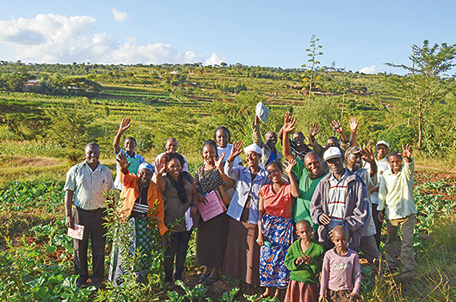
The farmers participating in the Smallholder Horticulture Empowerment and Promotion Unit Project (SHEP UP) in Kenya. (Photo: Takeshi Kuno / JICA)
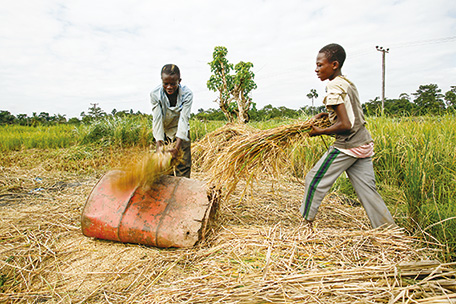
Boys in Ghana striking ears of rice against a drum to thresh. (Photo: Akio Iizuka / JICA)
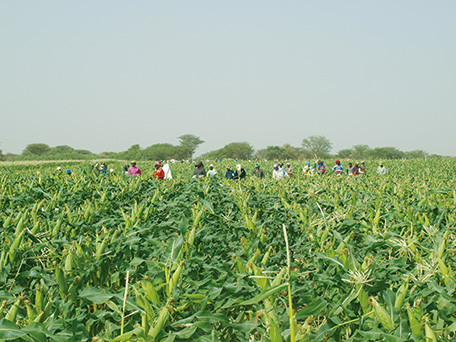
People harvesting sweet corn in a farm in a suburb of Saint-Louis, Northern Senegal. (Photo: Yosuke Kotsuji)
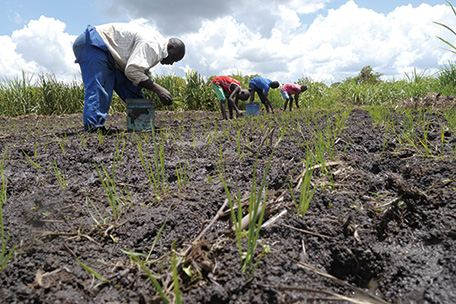
Farmers who started producing rice in 2013 planting rice again in 2014 in Zambia. (Photo: Kensuke Ueda)
Japan recognizes the importance of cooperation on agricultural efforts to reduce poverty, and Japan is proactively striving to address food problems as a global issue. In the short term, Japan provides food assistance to avert food shortages, and in the medium- to long-term, Japan aims to help increase and improve agriculture production and productivity in developing countries in order to prevent and eliminate the cause of food shortages including hunger.
Specifically, Japan uses its knowledge and experience to strengthen development and disseminate capacity of agricultural production technology suited to the cultivation environment, to promote the sustainable use of fishery resources, to strengthen organizations of farmers, to assist policy-making as well as to improve infrastructures such as irrigation facilities, farm roads, and fishing ports. Through these efforts, Japan extends various supports, from production, processing, distribution to sales phases. In Africa, Japan also supports the research of NERICA* (New Rice for Africa) and the spread of its production techniques, supports increasing rice production based on the Comprehensive Africa Agriculture Development Programme (CAADP), as well as supports the introduction of a market-based agricultural promotion (SHEP: Smallholder Horticulture Empowerment Project) approach*, among other supports. In addition, in order to assist reducing post-harvest loss*, revitalizing the food industry, and increasing rural incomes, Japan places priority on assistance for developing food value chains, i.e., creating added value of agricultural and fishery products along the process from production, processing, distribution, to consumption. Further, Japan provides assistance in the agricultural sector through the Food and Agriculture Organization of the UN (FAO), the International Fund for Agricultural Development (IFAD), the Consultative Group on International Agricultural Research (CGIAR), the World Food Programme (WFP), and other international organizations.
In addition, at an outreach session on food security at G8 L'Aquila Summit (Italy) in July 2009, Japan pledged at least $3 billion over three years in 2010-2012 for agricultural development including infrastructure, and provided approximately $3.9 billion (commitment basis) by the end of 2012. Additionally, the rapid increase of agricultural investment in developing countries has become an international issue since some of the investments were reported as “land grabbing” by some media outlets. For this reason, Japan proposed the concept of “Responsible Agricultural Investment (RAI)*” at the L'Aquila Summit and has since been gaining support at international fora such as the G8, G20 and APEC. Furthermore, based on the RAI concept, the Principles for Responsible Investment in Agriculture and Food Systems was discussed at the FAO the Committee on World Food Security (CFS) and was adopted at the CFS 41st Session in October 2014. Also, the New Alliance for Food Security and Nutrition* was established at the G8 Camp David Summit (the U.S.) in May 2012. At an event held in relation to the G8 Lough Erne Summit (the United Kingdom) in June 2013, the progress report of the New Alliance was published and new African partner countries were announced. It was also announced that under the framework of the New Alliance, the relevant international organizations will implement the “Forward-looking research and analysis programme for responsible agricultural investment” with financial support from Japan. In September 2013, Japan held the Japan-African Regional Economic Communities (RECs) Summit Roundtable in New York, and discussed issues of agricultural development. Japan has stressed the importance of agriculture as an industry that will play an important role in ensuring food security, reducing poverty, and stimulating economic growth throughout Africa, and contributes to the development of agriculture in Africa.
Furthermore, Japan also promotes efforts to assist the Agricultural Market Information System (AMIS)* in the G20, which aims to enhance agricultural market transparency.
At TICAD IV in 2008, Japan launched the Coalition for African Rice Development (CARD)*, and pledged assistance to double rice production in Sub-Saharan Africa from what was then 14 million tons to 28 million tons in ten years.
At TICAD V in June 2013, Japan announced that it would continue this assistance, and that as an assistance measure to promote market-based agriculture, it would provide assistance for human resources development of 1,000 technical advisers, develop organizations for 50,000 smallholder farmers, and dispatch cooperation experts, as well as promote the SHEP approach (to be rolled out in 10 countries), among other measures.
Agriculture was on the agenda at the First TICAD V Ministerial Meeting in May 2014, as the African Union (AU) identified 2014 as the Year of Agriculture and Food Security in Africa and for other reasons. At the meeting, Japan reported that it was steadily implementing the TICAD V support measures, explaining that rice production in Sub-Saharan Africa increased from 14 million tons to 20.7 million tons as of 2012 because of Japan's CARD initiative, and that as a result of introducing the SHEP approach, the incomes of smallholder farmers doubled in three years from 2006 in Kenya, the first country to adopt this approach. African countries expressed appreciation for these efforts.
- *NERICA
- NERICA (New Rice for Africa) is a general term for rice developed in 1994 by the Africa Rice Center (formerly West Africa Rice Development Association (WARDA)) through hybridization of high-yield Asian rice with African rice, which is strong against weeds, diseases and insect pests. Japan has also contributed to developing a variety of new types that are suited to the natural conditions of each region in Africa. The characteristics of the rice include (i) a higher yield, (ii) a shorter growth period, (iii) higher resistance to dryness (drought), and (iv) higher resistance to diseases and insect pests than conventional rice. Since 1997, Japan has partnered with international organizations and NGOs to provide support for research and development related to new types of NERICA, test cultivation, and increased production and popularization of seeds. In addition, Japan has dispatched agricultural experts and JOCV, and has accepted trainees from Africa for training in Japan.
- *Market-based agricultural promotion (SHEP*) approach for smallholder farmers
- The SHEP approach refers to an effort to assist smallholder farmers to enhance their agricultural organizations through trainings and research on local markets, and to provide guidance on cultivation techniques and development of agricultural roads while taking account of gender, in order to help them improve their capacities to manage their agricultural businesses in accordance with the market.
*SHEP: Smallholder Horticulture Empowerment Project - *Post-harvest loss
- Post-harvest loss refers to harvested food that is discarded, because it is unable to fulfill its originally intended purpose (for use as food, etc.)
This can be caused by improper harvest timing, and overexposure to rain or dryness, extremely high or low temperatures, germ contamination, or any other physical damage that reduces the value of the products due to primarily lack of adequate storage facilities. - *Coalition for African Rice Development (CARD)
- CARD is a consultative group composed of donor countries, African regional organizations, and international organizations partnered with rice-producing countries in Africa that are interested in rice development. The CARD Initiative was announced at TICAD IV in 2008. Japan plans to train 50,000 agricultural advisors in relation to doubling rice production.
- *Responsible Agricultural Investment
- Responsible Agricultural Investment refers to an initiative proposed by Japan at the G8 L'Aquila Summit in response to unintentional negative impacts that result from large-scale agricultural investment (acquisition of farmland with foreign capital) in developing countries. In addition to mitigating the negative impacts of agricultural investment, it aims to promote agricultural development in the host country as well as harmonize and maximize the benefits enjoyed by that country's government, local people, and investors.
- *New Alliance for Food Security and Nutrition
- The New Alliance for Food Security and Nutrition refers to an initiative that was launched at the Camp David Summit (the U.S.) in 2012 with the aim of achieving sustainable and inclusive agricultural growth and lifting 50 million people out of poverty in Sub-Saharan Africa over the next 10 years, with the cooperation of donor countries, African countries, and the private sector. Under the initiative, the Country Cooperation Framework was formulated for the African partner countries, which includes financial commitment from the donors, specific policy actions by the governments of the partner countries, and private-sector investment intents. By May 2014, the cooperation framework was formulated for ten countries, including Benin, Burkina Faso, Côte d'Ivoire, Ethiopia, Ghana, Malawi, Mozambique, Nigeria, Senegal, and Tanzania, and efforts are being promoted.
- *AMIS: Agricultural Market Information System
- AMIS was launched as a countermeasure against food price volatility by the G20 in 2011. It allows each of the G20 countries, the main exporting and importing countries, companies, and international organizations to share agricultural and food market information (production output, price, etc.) in a timely, precise, and transparent manner. Japan has supported the efforts of ASEAN countries through which they aim to improve the accuracy of ASEAN agricultural and statistical information used by AMIS as data.
| Bhutan
Horticulture Research and Development Project
Technical Cooperation Project (March 2010 – Ongoing)
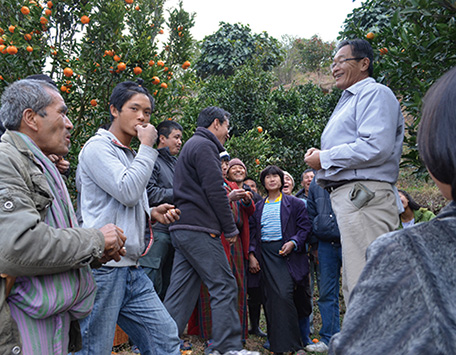
Technical training for the counterparts is conducted while visiting a farm field of the implementation agency, the Wengkhar Renewable Natural Resource Research and Development Center (right: Mr. Yuichi Tomiyasu, an expert) (Photo: JICA)
In Bhutan, approximately 70% of the population is scattered across rural areas, most of whom make a living in agriculture. However, Bhutan has limited arable land and cultivable crops due to its topography that includes many mountainous areas. In addition, its agriculture industry was far from being commercially viable, due to lack of infrastructure such as roads and markets had led to the underdevelopment of commercial agriculture in the country.
Under such circumstances, Japan has provided support for Bhutan's agricultural sector for more than 10 years, especially in the eastern region, which is one of the least developed parts in the country. Japan has extended technical cooperation to promote cultivation techniques for growing horticulture crops such as vegetables and fruit, including citrus fruits, pears, and persimmons, and to commercialize crops as a way of increasing farmers' incomes.
This project (“Horticulture Research and Development Project”) is being implemented in the six eastern districts (dzongkhags) of Mongar, Lhuntse, Trashiyangtse, Pemagatshel, Trashigang, and Samdrupjongkhar. The project aims to enable model farmers and neighboring farmers to practice horticultural agriculture, which is expected to increase their incomes. Various activities are carried out, such as the provision of technical guidance on production, processing, and distribution related to horticultural agriculture, creation of manuals and guidelines, provision of support for trainings and information dissemination, and strengthening of the supply system of seeds and seedlings.
Training is provided to approximately 100 extension workers1 and farmers every year. To date, more than 500 people have received training. Many of the trainees have attempted to cultivate fruits and vegetables they have not grown before. As a result, these farms, with their subsequent successes, came to be recognized as “model farms” for other farmers in their respective neighborhoods, with the latter starting to adopt the same farming techniques as those introduced in the former after the training program. In this way, a significant ripple effect of this project can also be observed. According to a survey, one trained farmer provided technical guidance to six farmers on average, and the farming techniques have spread to several thousand neighboring farmers. Consequently, the neighboring farmers' revenue from fruit sales has increased by 1.7 times on average.
In recognition of the contributions made by the project thus far, in February 2014, the Chief Advisor of the project, Mr. Yuichi Tomiyasu (JICA expert), and the Project Manager of the counterpart agency, Mr. Lhap Dorji (Head of the Wengkhar Renewable Natural Resource Research and Development Center), were awarded the National Order of Merit from the fifth King of Bhutan, His Majesty Jigme Khesar Namgyel Wangchuck. (As of August 2014)
*1 Personnel assigned to each district who gives advice and training on agricultural techniques and farm management to farmers.
| Senegal
Project on Improvement of Rice Productivity for Irrigation Schemes in the Valley of Senegal
Technical Cooperation Project (November 2009 – Ongoing)
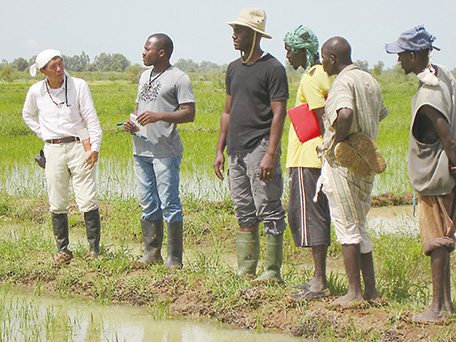
An expert, Mr. Takashi Kimijima and agriculture extension workers in Podor district in Northern Senegal. These agriculture extension workers will provide training on rice production for other farmers. (Photo: JICA)
Senegal's staple food is rice, and with an annual consumption of 74 kg per person, the country is among the largest rice consumers in West Africa. However, as most of the domestic rice consumption is met by imports from abroad, the Government of Senegal is taking steps to increase its self-sufficiency ratio in rice as a matter of national policy priority.
In order to support Senegal's efforts to increase its self-sufficiency ratio in domestically produced rice, Japan launched the “Project on Improvement of Rice Productivity for Irrigation Schemes in the Valley of Senegal” which covers the Saint-Louis Region in the northern valley of the Senegal River, a region that has the largest grain production in the country. The project was designed to expand domestic rice production and increase the revenue of rice producers. It has made a significant contribution to improving farmers' livelihoods through a series of initiatives aimed at: (i) improving rice growing techniques; (ii) acquiring mechanical engineering skills for the repair and renewal of irrigation facilities; and (iii) enhancing the management of the finances and loan schemes of producers. Consequently, the production of unhulled rice has increased by 23% and profits by 95%. In addition, through the introduction of rice milling and processing techniques that have been tailored to consumer needs, the project has contributed to improving the quality of domestically produced rice.
The project has been highly appreciated by the Government of Senegal, farmers, and other countries' aid agencies. On the occasion of the visit of President Francois Hollande of France to Japan in June 2013, Japan and France agreed to work together to promote rice cultivation in the valley of Senegal. Japan will implement Phase 2 of the project that aims to scale up its achievements in coordination with the irrigation facility development projects of the Agence Française de Développement (AFD) in the Senegal River area. Taking into account the growing entry of domestic and overseas private actors in the rice sector in this region, Phase 2 will include collaborating with the private sector to increase the production efficiency of farmers through various activities, such as the provision of agriculture machinery services.
In Senegal, Japan also has: (i) supported the development of a master plan for rice production (the Study on the Reorganization of the Rice Production in Senegal in 2006); (ii) extended assistance under the framework of the Coalition for African Rice Development (CARD); and (iii) along with experts, provided advice for policy formulation for rice production. Japan holistically supports the development of Senegal's rice sector, from policy planning to implementation on the ground, including JICA's co-chairing of multilateral donors' conferences in the agriculture sector held in Senegal. (As of August 2014)
